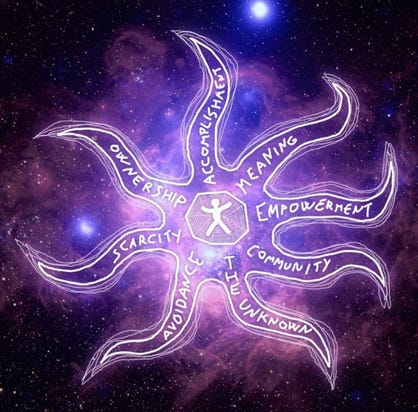🌱 Why Gamification Works?
On Gamification
We’ve been dabbling with the gamification of the workplace pretty much ever since we discovered how powerful games are at getting people oriented and moved to do things. There really isn't anything quite like gamification that can make boring & repetitive tasks feel exciting & fun. We had things like star collecting, badges and leaderboards - but it was all pretty basic stuff until this dude came along…
Yu-Kai-Chou
Feel free to refer to him as the gamification guru because he’s the one that defined the game, took it to the extreme and popularized it in the eyes of the business world.
Being a gaming geek studying economics with deep interests in behavioral economics and psychology of motivation seem to have been a perfect recipe for his magnum opus.
The Octalysis Framework
The Octalysis Framework is a breakdown of the elements that are contained in all the games people like playing. For better or worse, making a good-enough cocktail of these is sure to make people come back to playing a game again and again.
- This is because these are all the drives that a human being has, they can accommodate everything down to food, shelter and procreation. It's not hard to see how Maslow's hierarcy of needs maps to the Octalysis.
Mr. Yu-Kai-Chou spent countless hours summing them up, and I’m afraid I can’t do them that much justice, so here it is; directly from the master:
1) Epic Meaning & Calling
Epic Meaning & Calling is the Core Drive where a player believes that he is doing something greater than himself or he was “chosen” to do something. A symptom of this is a player that devotes a lot of his time to maintaining a forum or helping to create things for the entire community (think Wikipedia or Open Source projects).
2) Development & Accomplishment
Development & Accomplishment is the internal drive of making progress, developing skills, and eventually overcoming challenges. The word “challenge” here is very important, as a badge or trophy without a challenge is not meaningful at all.
3) Empowerment of Creativity & Feedback
Is when users are engaged in a creative process where they have to repeatedly figure things out and try different combinations. People not only need ways to express their creativity, but they need to be able to see the results of their creativity, receive feedback
4) Ownership & Possession
This is the drive where users are motivated because they feel like they own something. When a player feels ownership, she innately wants to make what she owns better and own even more. Besides being the major core drive for wanting to accumulate wealth, this deals with many virtual goods or virtual currencies within systems.
5) Social Influence & Relatedness
This drive incorporates all the social elements that drive people, including: mentorship, acceptance, social responses, companionship, as well as competition and envy. When you see a friend that is amazing at some skill or owns something extraordinary, you become driven to reach the same level. Also, it includes the drive we have to draw closer to people, places, or events that we can relate to.
6) Scarcity & Impatience
This is the drive of wanting something because you can’t have it. Many games have Appointment Dynamics (come back 2 hours later to get your reward) — the fact that people can’t get something right now motivates them to think about it all day long.
7) Unpredictability & Curiosity
Generally, this is a harmless drive of wanting to find out what will happen next. If you don’t know what’s going to happen, your brain is engaged and you think about it often. Many people watch movies or read novels because of this drive. However, this drive is also the primary factor behind gambling addiction.
8) Loss & Avoidance
This core drive is based upon the avoidance of something negative happening. On a small scale, it could be to avoid losing previous work. On a larger scale, it could be to avoid admitting that everything you did up to this point was useless because you are now quitting.
Here’s how they fail:
- Freemium games like FarmVille — they have mastered these techniques, and aren’t ashamed of using even the most devious of tactics to get your mom addicted and sell her shit she doesn’t need.
- RPGs like World of Warcraft — cater to these needs well; are empowering, offer achievement & community and can succeed at producing that feeling of meaning - but are unlikely to actually get you anywhere in life.
- Workplace gamification — there’s good examples, most aren’t. Unless the points collected amass you equity and allow to beat the big boss - they inevitably end up feeling like a well designed rat-race.
There’s hope:
- For game-games — the e-sports industry is on the rise, so there are chances that playing them all day (or night) might actually get you somewhere.
- For workplace gamification there's little hope until organizations start tending towards decentralization, both in terms of power & ownership over them — and we all know that's exactly what's happening in the DAO space 👀
See where this is going?
Enter MetaGame
If this is the first time you’re encountering it, welcome!
Here’s how to think about it:
- Social media meets freelancing meet role playing games.
All games currently in existence make use of a combination of the drives defined above. They cater to the basic human drives but they are still only games & are meaningless under the surface.
MetaGame has the opportunity to hit all of those drives and without any of it being fake.
If you’re familiar with what we’re trying to do, it should be clear now how we’re standing amidst a perfect opportunity to make creating a more equitable future of work and building a global Commons - actually fun and engaging.
Yay!
